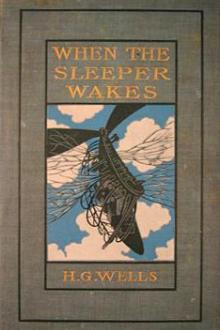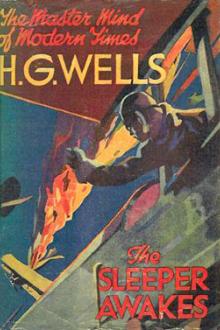The Sleeper Awakes<br />A Revised Edition of When the Sleeper Wakes, H. G. Wells [e novels for free TXT] 📗

- Author: H. G. Wells
Book online «The Sleeper Awakes<br />A Revised Edition of When the Sleeper Wakes, H. G. Wells [e novels for free TXT] 📗». Author H. G. Wells
He looked up and saw passing across a bridge of porcelain and looking down upon him, a face that was almost immediately hidden, the face of the girl he had seen overnight in the little room beyond the theatre after his escape from the Council. And she was watching him.
For the moment he did not remember when he had seen her, and then came a vague memory of the stirring emotions of their first encounter. But the dancing web of melody about him kept the air of that great marching song from his memory.
The lady to whom he talked repeated her remark, and Graham recalled himself to the quasi-regal flirtation upon which he was engaged.
Yet, unaccountably, a vague restlessness, a feeling that grew to dissatisfaction, came into his mind. He was troubled as if by some half forgotten duty, by the sense of things important slipping from him amidst this light and brilliance. The attraction that these ladies who crowded about him were beginning to exercise ceased. He no longer gave vague and clumsy responses to the subtly amorous advances that he was now assured were being made to him, and his eyes wandered for another sight of the girl of the first revolt.
Where, precisely, had he seen her?...
Graham was in one of the upper galleries in conversation with a bright-eyed lady on the subject of Eadhamite—the subject was his choice and not hers. He had interrupted her warm assurances of personal devotion with a matter-of-fact inquiry. He found her, as he had already found several other latter-day women that night, less well informed than charming. Suddenly, struggling against the eddying drift of nearer melody, the song of the Revolt, the great song he had heard in the Hall, hoarse and massive, came beating down to him.
Ah! Now he remembered!
He glanced up startled, and perceived above him an oeil de boeuf through which this song had come, and beyond, the upper courses of cable, the blue haze, and the pendant fabric of the lights of the public ways. He heard the song break into a tumult of voices and cease. He perceived quite clearly the drone and tumult of the moving platforms and a murmur of many people. He had a vague persuasion that he could not account for, a sort of instinctive feeling that outside in the ways a huge crowd must be watching this place in which their Master amused himself.
Though the song had stopped so abruptly, though the special music of this gathering reasserted itself, the motif of the marching song, once it had begun, lingered in his mind.
The bright-eyed lady was still struggling with the mysteries of Eadhamite when he perceived the girl he had seen in the theatre again. She was coming now along the gallery towards him; he saw her first before she saw him. She was dressed in a faintly luminous grey, her dark hair about her brows was like a cloud, and as he saw her the cold light from the circular opening into the ways fell upon her downcast face.
The lady in trouble about the Eadhamite saw the change in his expression, and grasped her opportunity to escape. “Would you care to know that girl, Sire?” she asked boldly. “She is Helen Wotton—a niece of Ostrog’s. She knows a great many serious things. She is one of the most serious persons alive. I am sure you will like her.”
In another moment Graham was talking to the girl, and the bright-eyed lady had fluttered away.
“I remember you quite well,” said Graham. “You were in that little room. When all the people were singing and beating time with their feet. Before I walked across the Hall.”
Her momentary embarrassment passed. She looked up at him, and her face was steady. “It was wonderful,” she said, hesitated, and spoke with a sudden effort. “All those people would have died for you, Sire. Countless people did die for you that night.”
Her face glowed. She glanced swiftly aside to see that no other heard her words.
Lincoln appeared some way off along the gallery, making his way through the press towards them. She saw him and turned to Graham strangely eager, with a swift change to confidence and intimacy. “Sire,” she said quickly, “I cannot tell you now and here. But the common people are very unhappy; they are oppressed—they are misgoverned. Do not forget the people, who faced death—death that you might live.”
“I know nothing—” began Graham.
“I cannot tell you now.”
Lincoln’s face appeared close to them. He bowed an apology to the girl.
“You find the new world amusing, Sire?” asked Lincoln, with smiling deference, and indicating the space and splendour of the gathering by one comprehensive gesture. “At any rate, you find it changed.”
“Yes,” said Graham, “changed. And yet, after all, not so greatly changed.”
“Wait till you are in the air,” said Lincoln. “The wind has fallen; even now an aeroplane awaits you.”
The girl’s attitude awaited dismissal.
Graham glanced at her face, was on the verge of a question, found a warning in her expression, bowed to her and turned to accompany Lincoln.
CHAPTER XVI. — THE MONOPLANE
The Flying Stages of London were collected together in an irregular crescent on the southern side of the river. They formed three groups of two each and retained the names of ancient suburban hills or villages. They were named in order, Roehampton, Wimbledon Park, Streatham, Norwood, Blackheath, and Shooter’s Hill. They were uniform structures rising high above the general roof surfaces. Each was about four thousand yards long and a thousand broad, and constructed of the compound of aluminum and iron that had replaced iron in architecture. Their higher tiers formed an openwork of girders through which lifts and staircases ascended. The upper surface was a uniform expanse, with portions—the starting carriers—that could be raised and were then able to run on very slightly inclined rails to the end of the fabric.
Graham went to the flying stages by the public ways. He was accompanied by Asano, his Japanese attendant. Lincoln was called away by Ostrog, who was busy with his administrative concerns. A strong guard of the Wind-Vane police awaited the Master outside the Wind-Vane offices, and they cleared a space for him on the upper moving platform. His passage to the flying stages was unexpected, nevertheless a considerable crowd gathered and followed him to his destination. As he went along, he could hear the people shouting his name, and saw numberless men and women and children in blue come swarming up the staircases in the central path, gesticulating and shouting. He could not hear what they shouted. He was struck again by the evident existence of a vulgar dialect among the poor of the city. When at last he descended, his guards were immediately surrounded by a dense excited crowd. Afterwards it occurred to him that some had attempted to





Comments (0)